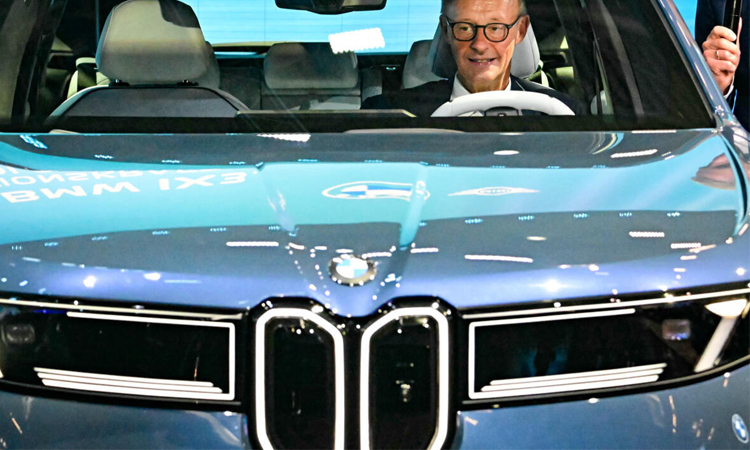News Flash

BERLIN, Oct 9, 2025 (AFP) - Chancellor Friedrich Merz will Thursday host crisis talks with German auto industry leaders in a bid to navigate myriad challenges, from a looming EU combustion-engine ban to growing Chinese competition.
Led by titans Volkswagen, BMW and Mercedes-Benz, the German auto sector has long been one of the flagship industries in Europe's biggest economy but now finds itself in the throes of a painful downturn.
From falling sales and profits to waves of layoffs, the sector has generated a steady stream of bad news for months.
Automakers and suppliers are struggling with a slower than expected electric shift, fierce competition from Chinese EV makers and US President Donald Trump's tariffs blitz.
Thursday's talks aim to chart a course forward for the industry, government spokesman Steffen Meyer told a recent press conference, adding the sector was "hugely important" for Germany.
"This applies not only to the major brands and manufacturers, but also to the suppliers, which are really crucial for prosperity and jobs in many regions," he said.
At the two-hour meeting at the chancellery in Berlin, Merz will be joined by top auto industry figures, several government ministers and union representatives.
Merz, Finance Minister Lars Klingbeil and the heads of auto industry group VDA and the IG Metall union are expected to deliver a statement after the talks at 1300 GMT.
- Engine row rumbles on -
High on the agenda will be the European Union's plan to end sales of new combustion-engine vehicles by 2035 as part of efforts to reduce greenhouse gas emissions.
German carmakers have voiced opposition to the ban, fearing it could hit their businesses as the EV shift moves slower than expected, and the EU pledged last month to fast-track a review of the policy.
Merz, of the centre-right CDU party, has since stepped up calls for the plans to be scrapped entirely, labelling them "wrong" this week.
But his stance has fuelled tensions with his junior coalition partners, the centre-left SPD, some of whose senior members insist the deadline should be maintained.
Ultimately the coalition may agree on a compromise to propose to Brussels, aiming to soften the ban but not do away with it entirely, according to German media reports.
Also on the table may be a proposal by Klingbeil to extend a tax break on EVs, which is due to expire at the start of 2026, by five years to help speed up the electric transition.
The Handelsblatt financial daily reported that the government was also examining the idea of allowing car manufacturers who use "green" steel made in Europe to face less stringent CO2 reduction targets.
But it is a complicated topic, and would need agreement from Brussels, it said.
Auto industry experts were sceptical that any major announcements would emerge from the meeting that could help the beleaguered sector.
Frank Schwope, an auto industry expert from the FHM university in Cologne, told AFP there could be some small announcements, such as investments in battery research.
But he added those attending "will discuss a lot and decide little, in part because decisions are made at the European level".